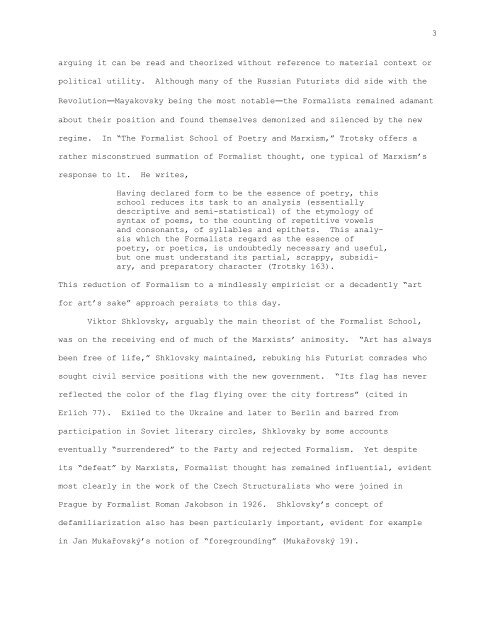Defamiliarization - Audrey Watters
Defamiliarization - Audrey Watters
Defamiliarization - Audrey Watters
Create successful ePaper yourself
Turn your PDF publications into a flip-book with our unique Google optimized e-Paper software.
arguing it can be read and theorized without reference to material context or<br />
political utility. Although many of the Russian Futurists did side with the<br />
Revolution—Mayakovsky being the most notable—the Formalists remained adamant<br />
about their position and found themselves demonized and silenced by the new<br />
regime. In “The Formalist School of Poetry and Marxism,” Trotsky offers a<br />
rather misconstrued summation of Formalist thought, one typical of Marxism’s<br />
response to it. He writes,<br />
Having declared form to be the essence of poetry, this<br />
school reduces its task to an analysis (essentially<br />
descriptive and semi-statistical) of the etymology of<br />
syntax of poems, to the counting of repetitive vowels<br />
and consonants, of syllables and epithets. This analy-<br />
sis which the Formalists regard as the essence of<br />
poetry, or poetics, is undoubtedly necessary and useful,<br />
but one must understand its partial, scrappy, subsidi-<br />
ary, and preparatory character (Trotsky 163).<br />
This reduction of Formalism to a mindlessly empiricist or a decadently “art<br />
for art’s sake” approach persists to this day.<br />
Viktor Shklovsky, arguably the main theorist of the Formalist School,<br />
was on the receiving end of much of the Marxists’ animosity. “Art has always<br />
been free of life,” Shklovsky maintained, rebuking his Futurist comrades who<br />
sought civil service positions with the new government. “Its flag has never<br />
reflected the color of the flag flying over the city fortress” (cited in<br />
Erlich 77). Exiled to the Ukraine and later to Berlin and barred from<br />
participation in Soviet literary circles, Shklovsky by some accounts<br />
eventually “surrendered” to the Party and rejected Formalism. Yet despite<br />
its “defeat” by Marxists, Formalist thought has remained influential, evident<br />
most clearly in the work of the Czech Structuralists who were joined in<br />
Prague by Formalist Roman Jakobson in 1926. Shklovsky’s concept of<br />
defamiliarization also has been particularly important, evident for example<br />
in Jan Mukařovský’s notion of “foregrounding” (Mukařovský 19).<br />
3


